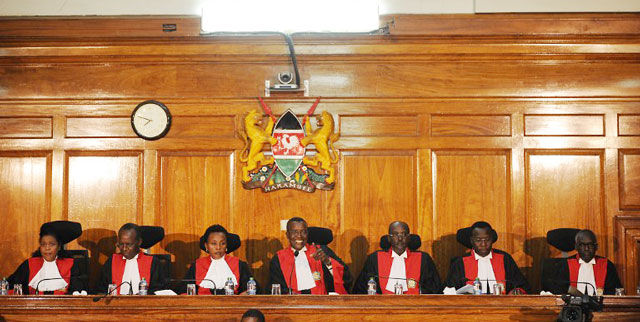
Nairobi, Kenya | AFP | Kenya’s Supreme Court on Wednesday blamed the election commission for last month’s annulled presidential vote, rebuking officials for bungling the transmission of results and basing the outcome on dubious documents.
The full ruling detailing the court’s shock decision on September 1 to annul President Uhuru Kenyatta’s victory struck a searing blow to the credibility of the election commission, casting doubt on its ability to organise a new poll in less than a month.
Deputy chief justice Philomena Mwilu described “disturbing, if not startling, revelations” about the conduct of the Independent Electoral and Boundaries Commission (IEBC) and singled it out for ignoring a Supreme Court order to open up its computer servers after opposition allegations of hacking.
The four judges who decided in a majority decision to annul the vote said the election commission had failed to verify the numbers before declaring Kenyatta the winner. Two judges also delivered dissenting judgements in the court session which lasted over 10 hours.
Lawyers for Raila Odinga’s National Super Alliance (NASA) coalition last month challenged Kenyatta’s re-election alleging rigging, hacking and tampering with results.
On the hacking charge, the IEBC was excoriated for failing to provide evidence that could have cleared up some of Odinga’s claims, with Mwilu arguing the burden of proof was on the electoral commission.
“Our order of scrutiny was a golden opportunity for the IEBC to place before the court evidence to debunk the petitioner’s claim,” Mwilu read from the court’s detailed judgement.
“If IEBC had nothing to hide it would have readily provided access to ICT (information and communications technology) logs and servers to disprove the petitioner’s claim.
“But what did IEBC do with it? It contemptuously disobeyed the court orders in these very critical areas.”
Mwilu said the judges were left with no choice but to accept opposition claims the election commission’s “ICT system was infiltrated and compromised and the data therein interfered with, or IEBC officials themselves interfered with the data, or it had bungled the transmission system and were unable to verify the data.”
However Chief Justice David Maraga rejected Odinga’s calls to prosecute top IEBC officials, saying there was no evidence to prove electoral offences.
“What we saw in evidence is systematic institutional problems and we were unable to find specific fingerprints of individuals who may have played a role in the commission of illegalities,” he said.
Maraga also said there was no evidence of misconduct from Kenyatta.
 The Independent Uganda: You get the Truth we Pay the Price
The Independent Uganda: You get the Truth we Pay the Price



